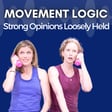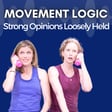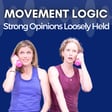
2: Scope of Practice
Welcome to Episode 2 of the Movement Logic podcast! In this episode, Sarah and Laurel discuss Scope of Practice and how it impacts our work as movement teachers and the choices we make when taking on clients. Here’s what we talk about:
· How do we define Scope of Practice, and how does it define our work
· What does a top down “macroScope” vs a personal “microScope” look like
· How do we decide who to work with and who to refer out
· Are there any pitfalls to having a scope of practice
· Do yoga teachers have to comply with the Yoga Alliance Scope of Practice
Sign up here for the Movement Logic Newsletter for course discounts and sales – our popular Foot & Ankle Tutorial is on sale soon!
Watch the video of this conversation at: www.movementlogictutorials.com/podcast
Want more Movement Logic?
- Follow us on IG: @movementlogictutorials
- Get on our mailing list for tons of free content
- Contact us (we're super friendly)
Thanks for listening!


